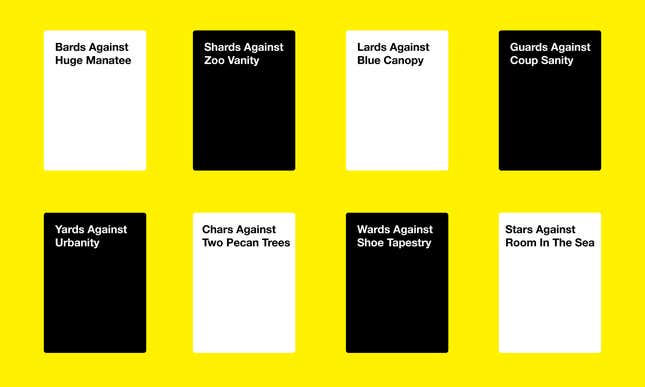
There’s a reason why Crabs Adjust Humidity, Humanity Hates Trump and Cards & Punishment might sound familiar. Their cards might look familiar, too—so familiar that the popular card game Cards Against Humanity has been forced to buckle down on those and several other lookalikes.
Cards Against Humanity doesn’t own the rights to black and white cards with Helvetica font and fill-in-the-blank mechanics. They don’t own the rights to the acronym “C.A.H” or to all uses of the word “humanity.” And yet, several card games with—let’s just say—extreme similarities to Cards Against Humanity complain that the blockbuster tabletop game for self-described “horrible people” is bullying them over intellectual property. (Ironically, Cards Against Humanity absorbed its own mechanics from the family-friendly card game Apples to Apples.)
In May, Cards Against Humanity pushed to remove Humanity Hates Trump from Kickstarter, where the self-described “expansion pack to Cards Against Humanity”—unofficially, of course—had raised over $20,000 dollars. Kickstarter obligingly erased the game’s fundraising campaign to avoid an intellectual property dispute. Humanity Hates Trump’s creator, the toy company SCS Direct, claims “corporate bullying.” In April, SCS Direct filed a complaint with the District Court for the District of Connecticut alleging that the popular card game “wrongfully and without justification made infringement assertions” against them.
Humanity Hates Trump hasn’t yet served the complaint, so no one there has received it in a formal legal sense. They say they want to work it out outside court.
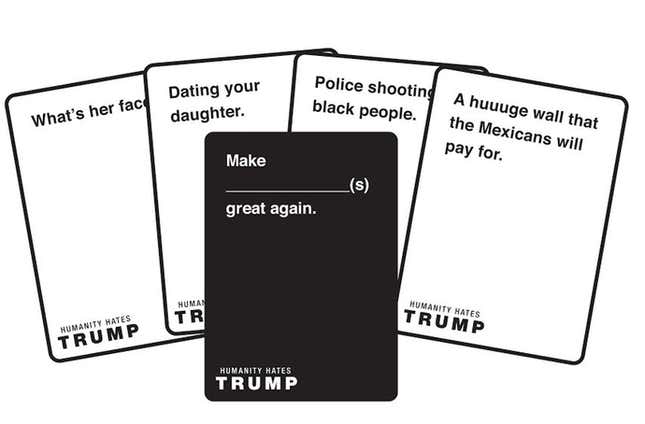
Co-creator Max Temkin describes Cards Against Humanity as “a free party game for horrible people.” On Kickstarter in 2011, he raised $15,000, three times the funding goal, to print the sardonic card game professionally. 80 black and 420 white cards comprised its core set, which players can also print at home at no cost. That’s possible because Cards Against Humanity has a Creative Commons license, so anyone can “use, remix, and share the game for free.”
There was something viral about Cards Against Humanity—or, at least, viral in a 2011 sense. The game was a sensation. Of course other tabletop designers wanted to join in on the fun. Free, unofficial expansions and interpretations of Cards Against Humanity cropped up everywhere, which Temkin says he relishes, so long as they follow the rules. Temkin told me he loves fan-made Cards Against Humanity expansions and knockoffs. The caveat: “You can’t sell it without our permission.” The Cards Against Humanity fine print adds, “Please do not steal our name or we will smash you.”
For inspired designers, though, the problem with following Cards Against Humanity’s IP rule against monetizing a lookalike is that making money off a free card game is very, very hard. One of the more popular Cards Against Humanity spin-offs, aptly titled Cards Against Originality, shuttered in March, 2015. A note on the game’s website titled “That Was Fun” explains that its creator couldn’t afford hosting fees anymore, even though “three million people spent a combined 47 years playing CAO.”
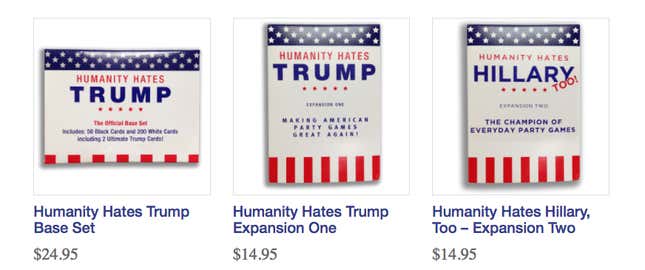
Humanity Hates Trump, published by toy company SCS Direct, did monetize their product. “Make ________ great again” is one of their black cards, which white cards like “Dating your daughter” and “A Huuuge wall that the Mexicans will pay for” can complete. Check Amazon and you’ll find it for a swell $28 ($25 on their site—the same price as Cards Against Humanity). Not to be partisan, SCS Direct also sells a set of cards called Humanity Hates Hillary, Too. The Amazon pages for both games note that customers who purchase them also regularly buy Cards Against Humanity.
Like other tabletop creators who wanted to get in on the Cards Against Humanity gravy train without going broke, Humanity Hates Trump’s creators will tell you that they’re in the same “genre” as Cards Against Humanity. It’s not an expansion. It’s not a fan interpretation. SCS Direct owner Howard Greenspan told me that Humanity Hates Trump is a “base game.” But, for a base game, it sure looks a lot like Cards Against Humanity. Since its now-removed Kickstarter campaign, Humanity Hates Trump still has black and white cards. The mechanics, of course, are fill-in-the-blank. Their logo is on the bottom left. Their font was Helvetica-like, but is no longer. And, to boot, their name had the tagline, “Cards Against Everybody.” Seem familiar?
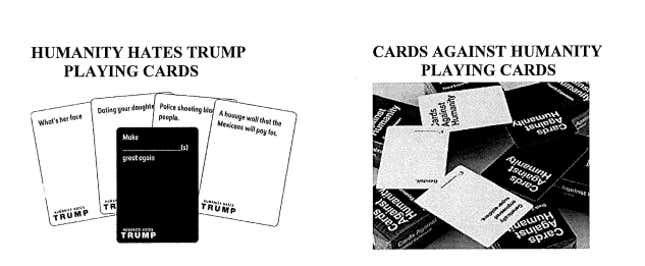
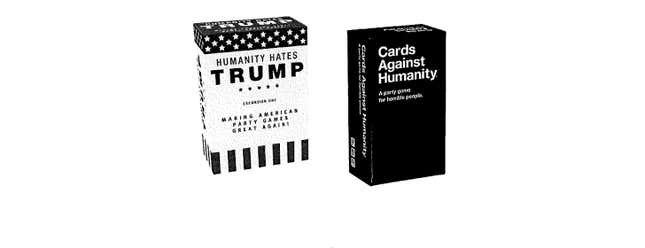
Greenspan told me that Cards Against Humanity has dominated the gaming card industry. And he doesn’t think it’s fair. “People will not produce games that compete against them just for fear of lawsuit,” he said.
After Humanity Hates Trump launched their Kickstarter, Cards Against Humanity says they started receiving e-mails from confused customers who thought the new Kickstarter was another expansion of theirs. During the election, Cards Against Humanity had actually released two Trump-related products: AmericaVotesWithCardsAgainstHumanity.com and the Donald Trump Bug Out Bag. The first was in planning for a year and a half before the election, and the second, Temkin cobbled together after Cruz dropped out of the race. “None of us knew that this Humanity Hates Trump game existed,” Temkin said. “We came up with the cutting-edge technology of making jokes about Donald Trump on our own.”
When Temkin and his team saw Humanity Hates Trump, they decided it just checked too many visual and branding boxes. There were too many similarities, a critical mass. It confused fans. Cards Against Humanity asked them to make some adjustments to the design and name—perhaps print the cards in colors, and not black and white. Change the font. Something. Humanity Hates Trump did make some changes to the original design (which, Greenspan insists, was for “virtual cards”), but they’re not happy about it. “They don’t own the right to ‘humanity,’” Greenspan said. “There’s been black and white cards since the beginning of time.”
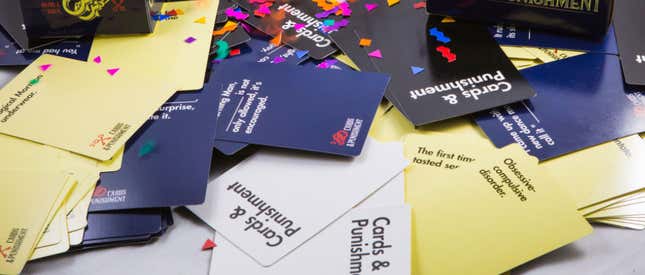
Temkin thinks that’s a total mischaracterization. He’s been to Target. He’s seen dozens of black and white card games. He said, “Some third-party expansions people publish—they want to publish cards that we don’t think are in good taste for Cards Against Humanity. If people think we made those packs, that’s embarrassing to us. No one owns a patent on the game mechanics. The issue is, if the thing looks so similar to us — the packaging and the typeface and all those factors — the public is expecting us to take accountability for those things. At some point we have to stand up for ourselves and say, ‘We don’t wanna stand behind this.’”
It’s happened before. Cards & Punishment creator Josh Perkins told me he originally printed his unofficial Cards Against Humanity expansion in black and white with black, white and red fonts. Now, the cards are dark blue and yellow. Perkins told me he’s “not interested in biting the hand that feeds” and changed his cards after Cards Against Humanity contacted him. He added that he “made the recommended changes to try to avoid any legal battles. We do this for fun, sell a small volume, and don’t make much money from this venture. It wasn’t worth the cost of the battle, and like their printer bluntly told me on the phone with a thick Jersey accent, ‘These boys have a lot of extra money.’” On its website, Cards & Punishment cutely describes itself as “an unofficial, unauthorized, underground, black market expansion pack for the most excellent party game, Cards Against Humanity (TM).”
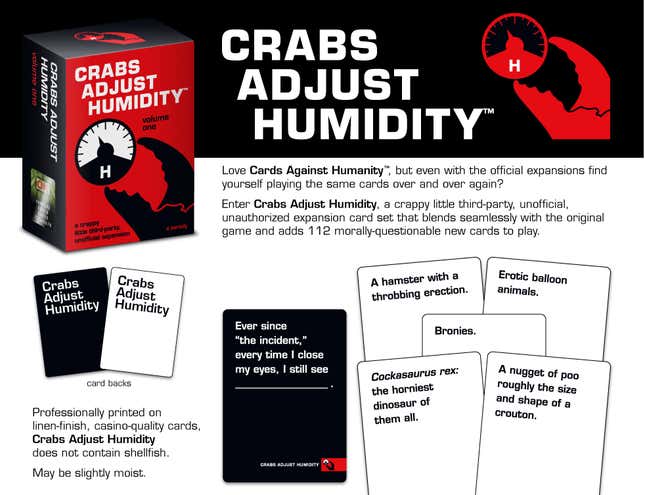
Last year, Crabs Adjust Humidity, published by Vampire Squid Cards, corresponded with Cards Against Humanity about desired changes. Their cards too are black and white with a small red, crab icon on the bottom right. Their acronym, hilariously, mimics Cards Against Humanity’s. The fonts too look similar. Over e-mail, Vampire Squid Cards owner Michael Kohler claims he tried “to forge a coexistence agreement,” but that Cards Against Humanity “insisted on some clauses to the contact that we simply couldn’t agree to.” They have a case in front of the Trademark Trial and Appeal Board. Kohler added, “We’re disappointed by CAH’s decision to oppose our registration of the Crabs Adjust Humidity trademarks, which we have been using for more than two and a half years. They never seemed to have a problem with our trademarks until recently. In fact, early on they told us that Crabs Adjust Humidity’s packaging ‘works for us.’” Right now, the status of their trademark claim reads “opposition pending.”
Cards Against Humanity kind of has to be a bully in these situations. While they encourage lookalikes, Cards Against Humanity draws the line at what co-creator Max Temkin calls “commercial exploitation.” Trade dress, a kind of intellectual property that applies to the general look of a product, is what’s at play. Just think of how Coca-Cola’s glass bottle signifies their brand—that’s trade dress. If a company doesn’t assert their ownership of a “look,” they might lose it.
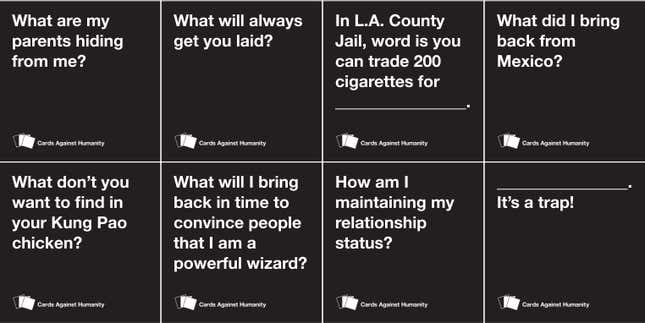
Video game lawyer Stephen McArthur, who says he is fascinated by the back-and-forth between Cards Against Humanity and games in its genre, published a blog post weighing in favor of Cards Against Humanity. Humanity Hates Trump went too far, he wrote. But he thinks Cards Against Humanity asserted their design trade dress inconsistently. “It will have a harder time making that argument in court now that it has presumably overlooked over a dozen other competitors and copycats using the exact same design aesthetic,” he said. Over the phone, McArthur elaborated that, “If Cards Against Humanity is the only game out there with black and white cards and that gameplay, if you see a second one, you’ll think it’s Cards Against Humanity. But if it’s 19-20 of them, you’re not gonna think it’s Cards Against Humanity.” When “likelihood for confusion” is the benchmark for asserting trade dress, having 19-20 lookalikes of a product can erode away that likelihood.
Temkin’s advice for those hypothetical 19-20 games “isn’t to copy how Cards Against Humanity looks or try to trick people into thinking we made your game. It’s actually much more valuable to stand out and develop your own audience,” he told me. In the competitive world of party games, who can say whether that’s true.
On Kickstarter.HumanityHatesTrump.com*, not actually Kickstarter, you can still “pledge” and receive any of ten Humanity Hates Trump packs. Humanity Hates Trump will continue to do business as long as they can on Amazon and around the web, although they’re still bitter about the plush $20,000 they missed out on. Amazon continues to direct interested consumers to Cards Against Humanity’s page.
[Update—5:05 PM]: A mention of Apples to Apples, the game that inspired Cards Against Humanity, was accidentally cut during the editing of this piece, so we’ve re-added it.
*Kickstarter.HumanityHatesTrump.com has gone down since this article’s publication.